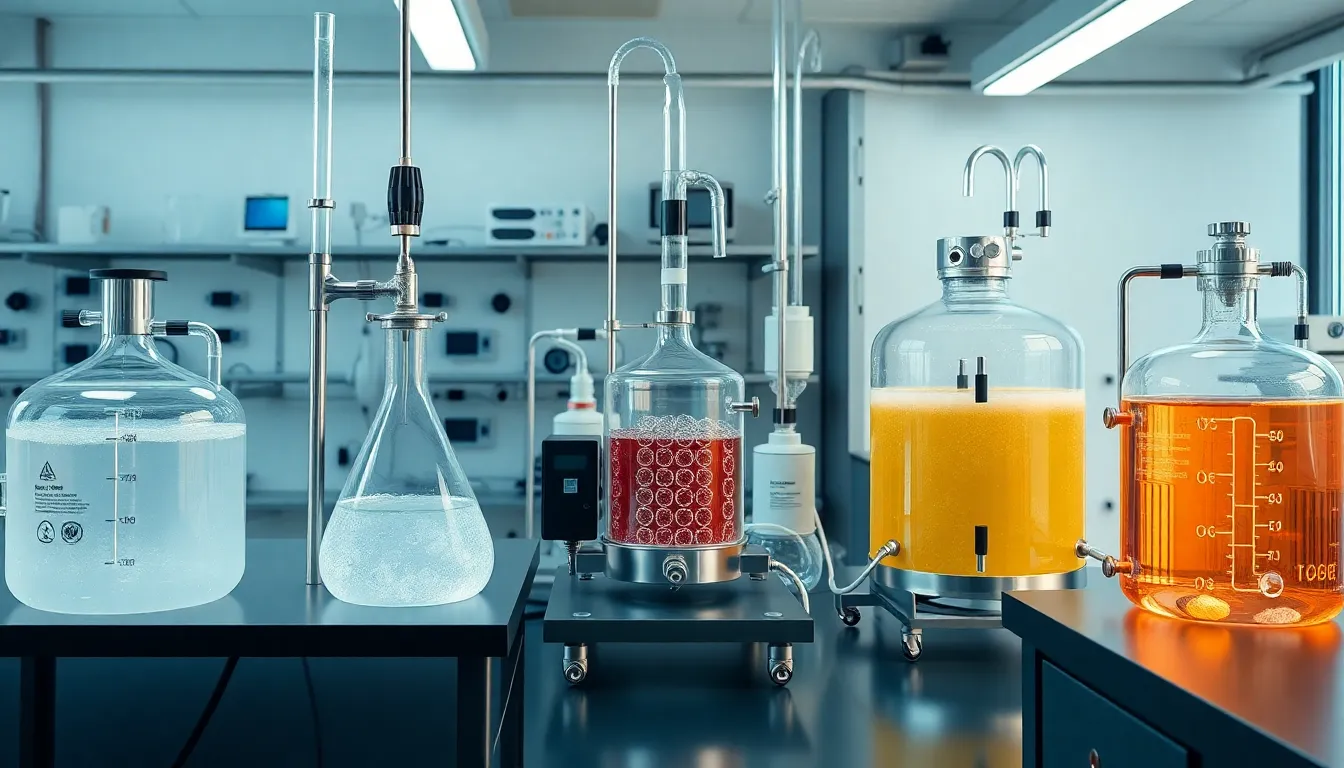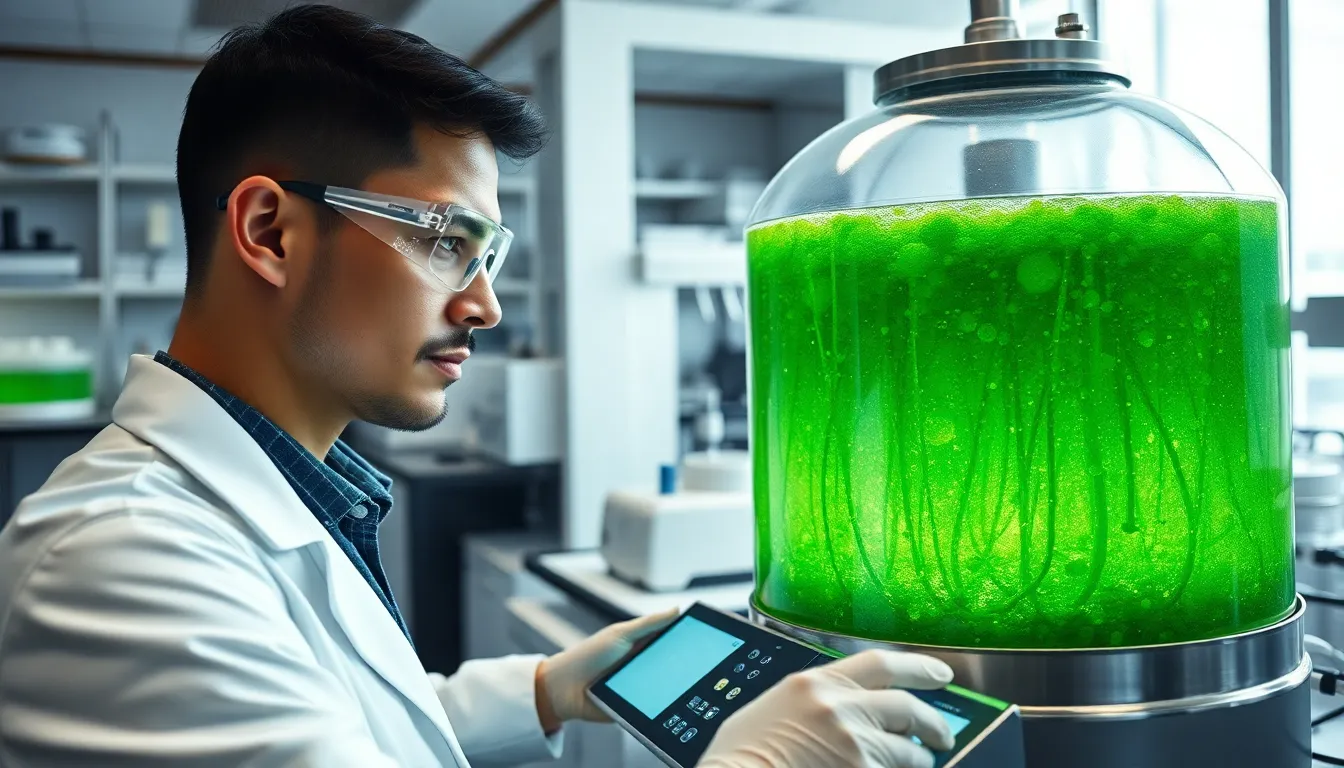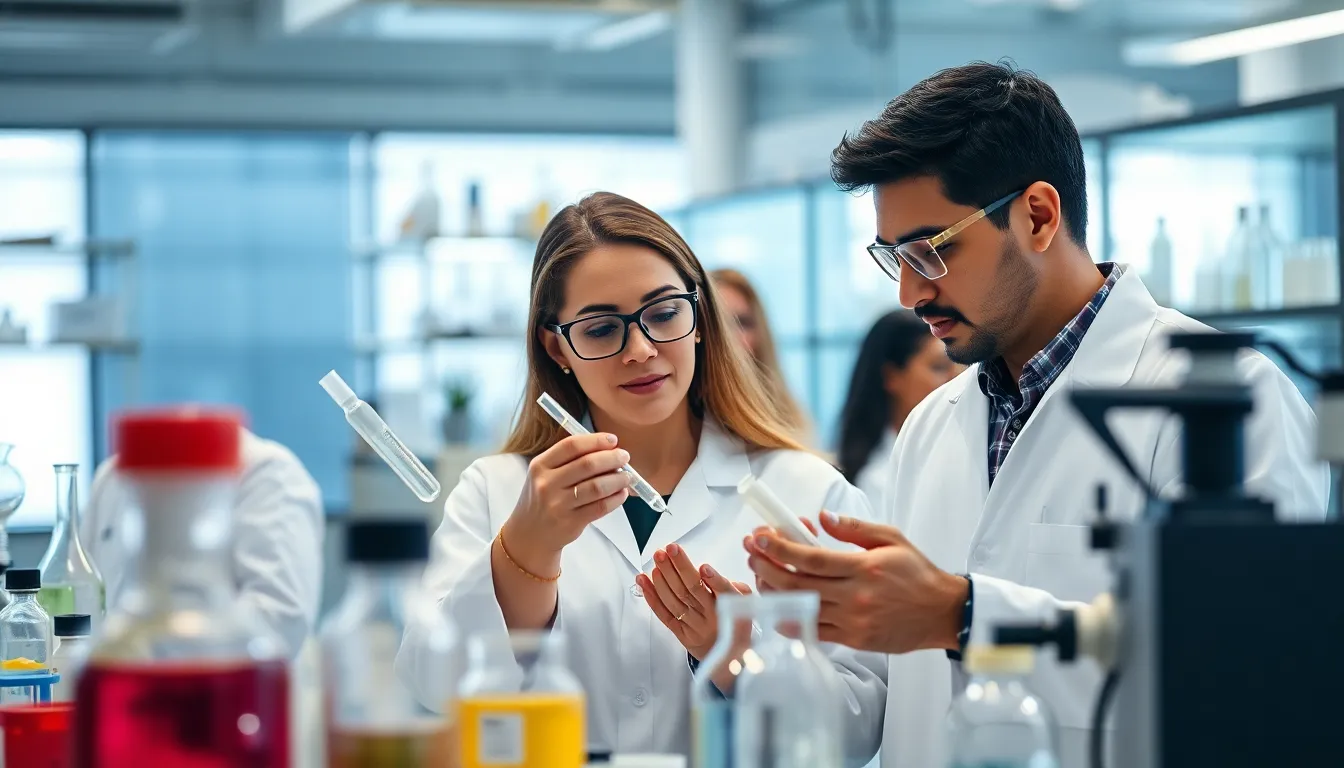In the world of biotechnology, bioreactors play a crucial role in transforming raw materials into valuable products. These sophisticated vessels create the ideal environment for microorganisms, cells, or enzymes to thrive, enabling efficient production processes. From pharmaceuticals to biofuels, bioreactors are at the heart of innovation, driving advancements in various industries.
As the demand for sustainable solutions grows, understanding bioreactors becomes increasingly important. They not only enhance productivity but also ensure consistency and safety in manufacturing. With technologies evolving rapidly, the future of bioreactors promises exciting possibilities that could reshape how we produce essential goods.
Table of Contents
ToggleOverview of Bioreactors
Bioreactors serve as controlled environments where biological processes occur, facilitating the growth of microorganisms, cells, or enzymes. These systems provide optimal conditions such as temperature, pH, and nutrient levels, essential for efficient biological transformations.
Types of Bioreactors
- Batch Bioreactors: Operate with a single batch of substrate, processing one cycle at a time. They are simple to manage and allow for precise control over reaction conditions.
- Fed-Batch Bioreactors: Allow for substrate additions during the process, extending the growth phase and increasing product yield. This approach combines the advantages of both batch and continuous systems.
- Continuous Bioreactors: Maintain a constant input of substrates and removal of products. They offer high productivity and are suitable for large-scale operations.
- Stirred-Tank Bioreactors: Feature mechanical agitation to ensure uniform mixing and oxygen transfer. They are widely used in industrial biotechnology for microbial fermentation.
- Airlift Bioreactors: Utilize rising air bubbles for circulation, minimizing shear stress on sensitive cells. These bioreactors excel in cultivating cells that require gentle handling.
Applications of Bioreactors
- Pharmaceutical Production: Bioreactors manufacture vaccines, antibiotics, and hormones, playing a critical role in drug development and quality control.
- Biofuel Production: In biofuel industries, bioreactors convert biomass to biofuels, supporting sustainable energy solutions.
- Food Processing: They enable fermentation processes for yogurt, cheese, and bioactive compounds, enhancing flavor and nutritional value.
- Environmental Biotechnology: Used in wastewater treatment, bioreactors promote the breakdown of pollutants and support bioremediation efforts.
Future Trends in Bioreactor Technology
- Automation: Advances in automation improve monitoring and control, driving efficiencies and reducing labor costs in bioprocessing.
- Integration of Artificial Intelligence: AI applications provide real-time data analysis, optimizing conditions for higher yields and better product quality.
- Miniaturization: Lab-scale bioreactors allow for faster experimental setups and cost-effective screening of conditions before scaling up.
Bioreactors continue to evolve, adapting to meet the increasing demands of various industries while contributing to a more sustainable future. Their integration of advanced technologies showcases potential benefits for both productivity and environmental stewardship.
Types of Bioreactors

Bioreactors come in various types, each designed to meet specific operational needs and applications. Understanding these types enhances knowledge about their roles in industrial processes.
Batch Bioreactors
Batch bioreactors operate in a closed system where substrates are added, and reactions occur without any further inputs until the process completes. Nutrients and microorganisms combine at desired levels, allowing for controlled reactions. Products are harvested after a set period. This type is suitable for producing pharmaceuticals, as it maintains high product quality and requires less complex equipment.
Continuous Bioreactors
Continuous bioreactors maintain a constant flow of nutrients and removal of products throughout the operation. This method allows for an uninterrupted production process, resulting in higher overall productivity. Continuous systems are often used in large-scale applications such as biofuel production and wastewater treatment. The consistent environment also promotes stable microbial communities, enhancing product yield.
Fed-Batch Bioreactors
Fed-batch bioreactors combine elements of both batch and continuous systems. Initially, substrates are added to the reactor, but additional nutrients are fed during the process. This method helps control the growth of microorganisms and prevents substrate inhibition. It’s widely used in the pharmaceutical industry for the production of metabolites, like antibodies, as it allows precise control over growth conditions and product formation.
Applications of Bioreactors
Bioreactors serve vital functions across various industries, transforming raw materials into essential products. The following subsections detail specific applications, highlighting their contributions to pharmaceutical production, biofuels production, and waste treatment.
Pharmaceutical Production
Bioreactors significantly impact pharmaceutical production, especially in creating vaccines, antibiotics, and hormones. They provide controlled environments that promote optimal growth and product yield from microorganisms or cell cultures. For instance, bioreactors maintain precise temperature and pH levels, ensuring the viability of engineered cells. This technology enhances the efficiency of producing critical drug components, with specific bioreactors designed for scaling up from lab to industrial levels, ensuring consistent product quality and safety.
Biofuels Production
Bioreactors play a crucial role in biofuels production by converting biomass into renewable energy sources. Continuous bioreactors, particularly, facilitate the ongoing fermentation process that breaks down organic materials into bioethanol or biodiesel. They enable the constant flow of substrates and simultaneous extraction of products, reducing downtime and increasing overall efficiency. This approach supports sustainability by providing alternatives to fossil fuels and aligning with global energy demands.
Waste Treatment
Bioreactors are essential for waste treatment, particularly in wastewater management and bioremediation efforts. They optimize microbial processes that break down pollutants and contaminants effectively. Aerobic and anaerobic bioreactors harness natural biological processes to treat industrial waste and municipal effluents. These systems not only mitigate environmental impacts but also recover valuable resources such as biogas, aiding in both waste reduction and energy production.
Advantages of Using Bioreactors
Bioreactors offer several advantages in biotechnology that contribute to efficiency and sustainability in various applications.
- Increased Productivity
Bioreactors enhance productivity by creating optimal conditions for microorganisms, cells, or enzymes to grow and function. Continuous bioreactors, for instance, maintain a steady flow of nutrients, allowing for higher yields over longer periods.
- Consistency in Production
Bioreactors provide controlled environments, ensuring uniformity in product quality. This is essential in pharmaceutical manufacturing, where batch variability can impact drug efficacy. The precision in parameters such as temperature and pH leads to reproducible results across production cycles.
- Scalability
Bioreactors enable easy scaling from laboratory to industrial production. Transitioning from small-scale fed-batch bioreactors to large-scale systems allows companies to meet growing market demands without significant changes to processes or equipment.
- Enhanced Safety
Bioreactors reduce risks associated with biological processes. Enclosed systems minimize exposure to hazardous microorganisms or chemicals, ensuring safer working conditions for operators.
- Resource Recovery
Bioreactors optimize resource utilization, especially in environmental applications. They facilitate the breakdown of pollutants in wastewater treatment, recovering valuable byproducts while maintaining ecological balance.
- Versatility
Bioreactors can be adapted for various applications, from pharmaceutical production to biofuel generation. Different bioreactor types cater to specific needs, such as stirred-tank designs for high-shear applications and airlift designs for gentler processes.
- Sustainability
Bioreactors promote sustainable practices by maximizing resource efficiency. They enable the production of renewable energy sources through biofuels and contribute to waste reduction via bioremediation techniques.
- Access to Advanced Technologies
The integration of automation and artificial intelligence in bioreactor systems enhances process monitoring and control. These advancements lead to improved data accuracy and more efficient operations, further driving the benefits of using bioreactors in modern biotechnology.
These advantages position bioreactors as crucial tools in achieving sustainable solutions across diverse industries, fulfilling the growing demand for efficient and eco-friendly production methods.
Challenges in Bioreactor Operation
Bioreactor operation presents various challenges that can affect efficiency and product yield across multiple applications. Understanding these challenges is crucial for optimizing bioprocess performance.
- Contamination Risks
Contamination by unwanted microorganisms can compromise product quality and yield. Maintaining sterile conditions during the operation is essential to prevent microbial contamination, which often leads to costly batch failures.
- Variable Conditions
Bioprocesses require precise control of conditions such as pH, temperature, and oxygen levels. Fluctuations in these parameters can negatively impact cell growth and product synthesis, causing variability in the final product.
- Nutrient Limitations
Providing optimal nutrient levels is vital for cell metabolism. Inadequate nutrient supply can lead to suboptimal growth and reduced productivity. Monitoring nutrient consumption continuously helps in adjusting feed rates to maintain ideal growth conditions.
- Scale-Up Challenges
Scaling up bioprocesses from laboratory to industrial levels poses significant challenges. Changes in mixing efficiency, heat transfer, and mass transfer rates can occur, leading to discrepancies in performance and output.
- Equipment Failure
Mechanical failures of bioreactor systems can result in significant downtime and loss of product. Regular maintenance and monitoring systems are necessary to minimize the risk of equipment failure during operation.
- Data Management
Handling large volumes of data generated during bioprocessing can overwhelm traditional data management systems. Implementing robust data analytics tools is essential for real-time analysis and decision-making in bioreactor operations.
- Regulatory Compliance
Compliance with industry standards and regulations can complicate bioreactor operation. Maintaining documentation, ensuring quality control, and adhering to safety protocols are critical to preventing legal issues and ensuring product safety.
By addressing these challenges head-on, continuous advancements in bioreactor technology can enhance the efficiency and reliability of bioprocesses in biotechnology.
Bioreactors stand at the forefront of biotechnology innovation. Their ability to create optimal environments for biological processes drives advancements across multiple industries. As the demand for sustainable solutions grows bioreactors will play a pivotal role in meeting these challenges.
Future developments in bioreactor technology promise to enhance efficiency and productivity while addressing existing operational challenges. By integrating automation and artificial intelligence bioreactors will not only improve production processes but also contribute to environmental sustainability.
The ongoing evolution of bioreactors reflects a commitment to harnessing biological systems for the benefit of society. Their versatility and adaptability ensure they remain essential tools in the quest for innovative and sustainable solutions.




